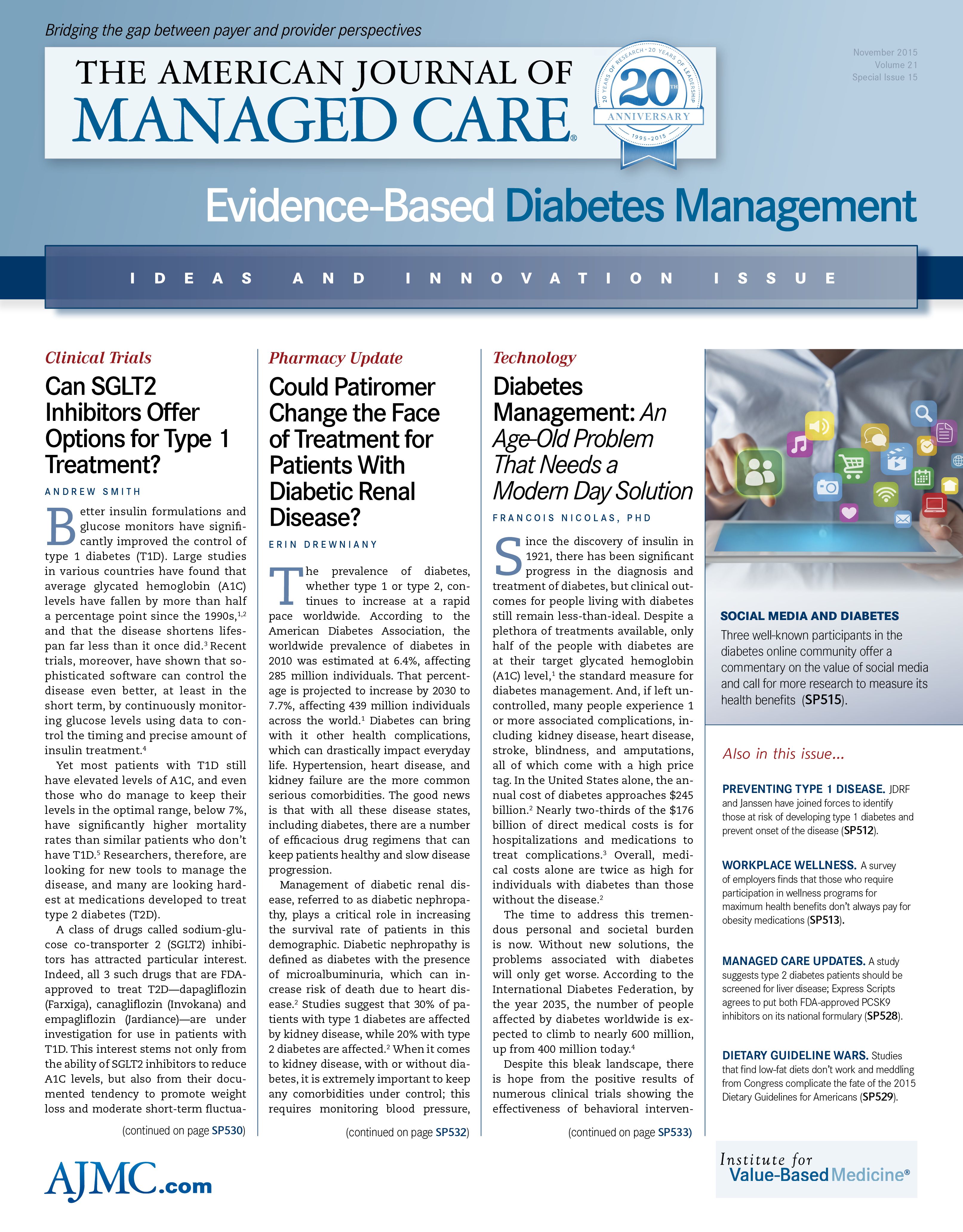- Center on Health Equity & Access
- Clinical
- Health Care Cost
- Health Care Delivery
- Insurance
- Policy
- Technology
- Value-Based Care
New Drug Application for Lixisenatide Accepted; CV Results Already in Hand
Results from the ELIXA trial were presented in June at the 75th Scientific Sessions of the American Diabetes Association.
FDA has accepted a new drug application (NDA) for Sanofi’s lixisenatide, a GLP-1 receptor agonist, marking the first time that such a filing included data from a cardiovascular (CV) outcomes trial, the company announced September 29, 2015.
Lixisenatide, approved in Europe under the brand name Lyxumia, treats adults with type 2 diabetes; it has been studied both alone and in combination with Sanofi’s mainstay insulin, Lantus. The NDA announcement is based on results from the Get-Goal clinical program, whose results were reported in 2014,1,2 and whose CV results were presented in June at the 75th Scientific Sessions of the American Diabetes Association (ADA).3
In support of the NDA, Sanofi included results of 11 multinational, phase 3 clinical trials, in which the main efficacy endpoints were met, with reductions in glycated hemoglobin (A1C) ranging from 0.7% to 1.0%.1 Results from one of those trials, reported in Diabetic Medicine in February 2014, found that lixisenatide, given once daily in both 1- and 2-step dose increases, significantly improved A1C at week 24 compared with placebo and allowed more patients to achieve an A1C of less than 7.0%.2
What sets lixisenatide apart is the ELIXA trial, which were the first CV results from the glucagon-like peptide 1 (GLP-1) receptor agonist class.3 The trial found that there were no CV benefits or risks from the therapy, which works in the pancreas by suppressing glucagon secretion from the alpha cells and stimulating glucose-dependent insulin by the beta cells. Of note, the ELIXA trial found no risk of pancreatic injury, something that has been of particular concern to FDA.
US regulators have been requiring long-term CV trials for new diabetes and cholesterol medications in the wake of embarrassing events in the prior decade. In one episode, the agency was forced to limit sales of rosiglitazone after that blockbuster drug was linked to risk of heart attacks based on a report published in the New England Journal of Medicine.4 For example, when the FDA recently approved the new class of cholesterol medications, the PCSK9 inhibitors, it limited indications while awaiting results of long-term safety trials, which are expected in 2017. Indications in Europe for these same drugs are much broader.5
In a statement, Sanofi’s Pierre Chancel, senior vice president and head of Global Diabetes, said, “Sanofi’s integrated portfolio of marketed products provides treatment, monitoring and support at every stage of the diabetes journey. Lixisenatide is a critical element of this portfolio, and we look forward to working with the FDA during the review process with the goal of bringing lixisenatide to patients in the United States.”1 References
1. Bain SC. The clinical development program of lixisenatide: a once-daily glucagon-like peptide-1 receptor agonist. Diabetes Ther. 2014;5(2):367-383.
2. Bolli GB, Munteanu M, Dotsenko S, Niemoeller E, Boka G, Wu Y, Hanefeld M. Efficacy and safety of lixisentaide once daily vs placebo in people with type 2 diabetes insufficiently controlled on metformin (GetGoal-F1). Diabet Med. 2014;31(2):176-184.
3. Caffrey MK. ELIXA trial results find no cardiac risk, benefit for lixisenatide. American Journal of Managed Care website. Conference coverage, 75th Scientific Sessions of the American Diabetes Association. ww.ajmc.com/conferences/ADA2015/elixa-trial-results-find-no-cardiac-risk-benefit-for-lixisenatide. Published June 9, 2015. Accessed September 29, 2015.
4. Regan TL, FDA mea culpa part of cautionary tale. Am J Manag Care. 2013;19(SP7):SP242-SP243.
5. Caffrey MK. CVS to wait for 2nd approval before seeking prices on PCSK9 inhibitors. American Journal of Managed Care website. http://www.ajmc.com/newsroom/cvs-to-wait-for-2nd-approval-before-seeking-prices-on-pcsk9-inhibitors. Published August 10, 2015. Accessed October 10, 2015.

Quality of Life: The Pending Outcome in Idiopathic Pulmonary Fibrosis
February 6th 2026Because evidence gaps in idiopathic pulmonary fibrosis research hinder demonstration of antifibrotic therapies’ impact on patient quality of life (QOL), integrating validated health-related QOL measures into trials is urgently needed.
Read More
What It Takes to Improve Guideline-Based Heart Failure Care With Ty J. Gluckman, MD
August 5th 2025Explore innovative strategies to enhance heart failure treatment through guideline-directed medical therapy, remote monitoring, and artificial intelligence–driven solutions for better patient outcomes.
Listen
From Polypharmacy to Personalized Care: Dr Nihar Desai Discusses Holistic Cardiovascular Care
May 30th 2024In this episode of Managed Care Cast, Nihar Desai, MD, MPH, cardiologist and vice chief of Cardiology at the Yale School of Medicine, discusses therapies for cardiovascular conditions as they relate to patient adherence, polypharmacy, and health access.
Listen
Ambient AI Tool Adoption in US Hospitals and Associated Factors
January 27th 2026Nearly two-thirds of hospitals using Epic have adopted ambient artificial intelligence (AI), with higher uptake among larger, not-for-profit hospitals and those with higher workload and stronger financial performance.
Read More
Motivating and Enabling Factors Supporting Targeted Improvements to Hospital-SNF Transitions
January 26th 2026Skilled nursing facilities (SNFs) with a high volume of referred patients with Alzheimer disease and related dementias may work harder to manage care transitions with less availability of resources that enable high-quality handoffs.
Read More

